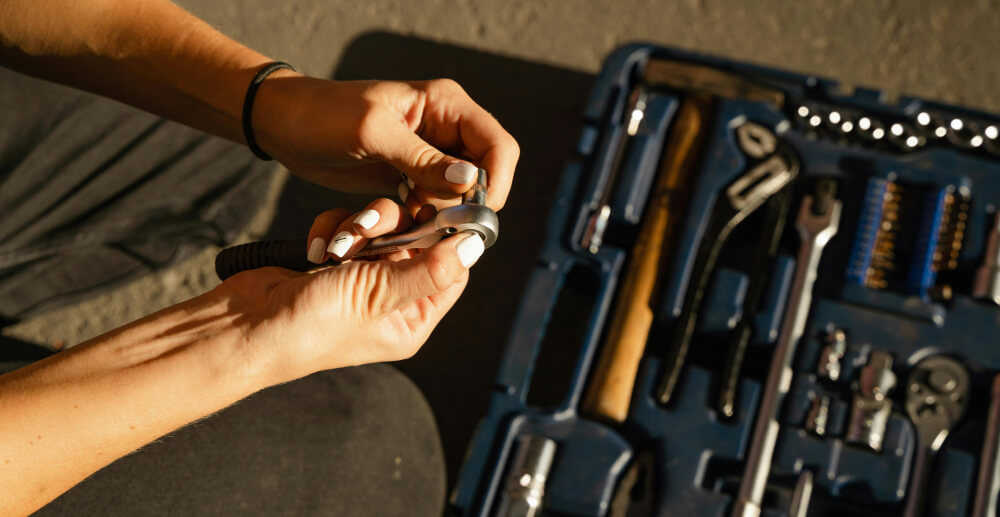A recovery toolkit (or “spiritual toolkit” or “spiritual toolbox”) is a set of action-based practices and strategies that support us in our recovery journey. These tools can help us feel more stable, happy, focused, or relaxed, and can help us navigate our triggers, cope with our cravings, and manage our emotions.
In the past, I’ve shared articles called “What’s in Your Recovery Toolkit?” and “More Tools for Your Recovery Toolkit” listing a few more of the tools that might serve you in your recovery. Here are some additional tools to consider:
Rest
Often we feel as though, in recovery, we need to make up for the time and productivity we may have lost in our active addiction. Or we believe that we have to do aaaallllll of the recovery activities and meetings, right now! Both of these perspectives are out of balance. While it is amazing to be able to make progress again and recovery activities can be helpful, we also have to take time to rest. This includes taking breaks as well as doing our best to get enough sleep. Learn more about some of the ways to promote healthy sleep here.
Aromatherapy
Our sense of smell is strongly connected to our memory and emotions. There are a lot of ways to bring scent into your life, from scented candles or wax melts to essential oils to fresh flowers or baked goods. Try some out to see which scents make you feel soothed, energized, or happier.
Take your meds as directed
This one applies to a whole range of medications that support your well-being. It could be medication-assisted treatment (buprenorphine, methadone, or naltrexone for opioid use disorder or naltrexone or acamprosate for alcohol use disorder), mental health medication like anti-depressants or anti-anxiety medication, or prescriptions for your health (like blood pressure medicine, insulin, etc.). If there is a medication you’re supposed to be taking for your mental or physical health, take it as directed and follow up with your healthcare provider about any concerns you have.
Hobbies and activities
In active addiction, it’s wild how much of our time we devote to getting, using, hiding, and recovering from substances. Once we get into recovery, suddenly we have a lot of that time back. It can be freeing, but it can also be … well, boring. It’s important to fill that time, especially with activities we enjoy. Our Community Manager Max shared a post about how geo-caching supports their recovery.
Rephrase
If you find yourself thinking in rigid, black-and-white ways (about yourself or others), it can cause you to misjudge situations. Calming your language is a good first step to calming your mind. Try to rephrase your thoughts by dropping extreme words that imply certainty (like definitely, completely, or never). Also, look for loaded, judgmental terms like mean names or other insults.
Play the tape through
Playing the tape through is a mental exercise that can help you fight back against a craving when it strikes. Imagine the scenario as a movie, and get really honest about the likely outcomes and consequences of giving into the craving. Based on your past experiences, would you drink or use safely? Or would you probably want more? What might happen if you follow that urge? Once you got it, how would you and the people around you act? Again, be very honest based on your past experiences, and don’t romanticize drinking or using. What is the likely fallout for your finances, relationships, job, or legal issues?
We all come into recovery for a reason (sometimes for a lot of reasons). When cravings crop up, it can be hard to keep those reasons in the front of our minds. Playing the tape through can be a reminder of the consequences of our addictive behaviors, allowing us the time and motivation to get through the craving.
Plan ahead
Triggers can be a big deal in addiction recovery. These are all of those people, places, things, emotions, and situations that spur a sudden craving, an intense memory of drinking or using, or an ingrained pattern of thought or behavior. Identifying our triggers is a vital step, but once we can recognize them, we still need to plan how we’re going to handle them. Spend some time thinking through your triggers and figuring out some ways to navigate them. Since triggers vary wildly, so will the strategies for coping with them. A few kinds of plans might include: thinking of excuses for not hanging out with old acquaintances, installing a rideshare app to be sure you always have a way to leave a party or event, taking only limited money with you when leaving the house, or asking recovery friends to be your backup, among many others.
Get symbolic
I’m a huge fan of symbolic action in my recovery. I love writing down my fears and shames and then (safely) burning them. I like writing hopes and intentions on seed-paper and planting them to grow into flowers. I like blowing bubbles to carry my prayers away on the wind. I even like really simple symbolic actions, like “shaking off” negative thoughts.
If this kind of symbolism feels cheesy to you, feel free to skip this one. But if you’re like me, give it a try. These symbolic actions can make me feel more balanced and dedicated to my recovery.
Progressive muscle relaxation
Progressive muscle relaxation (PMR) is a grounding tool that can help you relax and cope with triggers or anxiety. In PMR, you intentionally tense and then relax particular muscles, in a sequence. For example, tensing your toes into fists, holding for a slow count of ten, and then release all of that tension. Then do the same thing with the muscles of your calves, then your thighs, and on through your body. This process functions a lot like breathwork, interrupting your body’s stressed physical response and encouraging it to calm down.
Acknowledge emotions
Some of us aren’t very good at identifying and acknowledging our emotions, especially when they’re ones we think we’re not “supposed” to be feeling. If you find yourself tense or emotionally disturbed, try to identify what you’re feeling, and then try not to judge yourself for feeling it. A wheel of emotions like this one could help you to identify your emotions.
After you’ve identified and acknowledged your feelings, you can think through if and how you want to respond to them.
Make a timeline
There’s a phrase I sometimes hear in recovery circles: “I have a built-in forgetter.” When people say that, they usually mean that they easily forget and dismiss the reality of their past substance use and how it affected them. One of the ways to combat this is to make a timeline of when and how you drank or used, and what kinds of things were going on in your life during those times. Personally, I was pretty surprised to discover that some of my health and depression issues were so tied to my past drinking. Then add your recovery. My milestones—getting through holidays sober, being fully present and aware at events—seemed pretty small until I saw them laid out on my timeline.
Having a timeline down on paper can be a tangible reminder of where you’ve been and how far you’ve come, encouraging you to keep on your recovery journey.
Light
Sunlight can have a major effect on our mood and mental state. Try to get some sunlight every day when possible (while wearing sunscreen). If the weather isn’t conducive to going out, sitting in a sunlit window can work. Or try a light therapy lamp—it doesn’t have to be expensive.
Mantras
A mantra is a word or phrase that you repeat to help you concentrate, find peace and comfort, and reduce overwhelming feelings. Your mantra can be any word or phrase that works for you, personally. It could be an affirmation, saying, quote, or prayer. It could even be a phrase or word you heard in a poem or song. Repeat your mantra out loud or in your head to help you feel stable and calmed.
As I’ve mentioned in our previous articles about building a recovery toolkit, it can be helpful to create a physical reminder of the tools that work for you. We call this a “Coping Card,” and you can write it on a card to keep in your pocket or wallet, or make a list on your phone—whatever will make it easy for you to find and use when a craving or painful situation crops up. Your Coping Card could include:
- a list of several tools from your recovery toolkit
- a reminder of why you’re in recovery
- names and numbers of three people to call for support
- a meaningful quote, slogan, or mantra
When you need a coping tool, your Coping Card can help you remember which ones to reach for.




